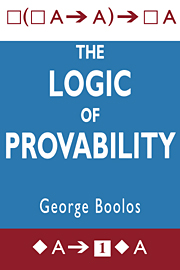Book contents
- Frontmatter
- Contents
- Preface
- Introduction
- 1 GL and other systems of propositional modal logic
- 2 Peano arithmetic
- 3 The box as Bew(x)
- 4 Semantics for GL and other modal logics
- 5 Completeness and decidability of GL and K, K4, T, B, S4, and S5
- 6 Canonical models
- 7 On GL
- 8 The fixed point theorem
- 9 The arithmetical completeness theorems for GL and GLS
- 10 Trees for GL
- 11 An incomplete system of modal logic
- 12 An S4-preserving proof-theoretical treatment of modality
- 13 Modal logic within set theory
- 14 Modal logic within analysis
- 15 The joint provability logic of consistency and ω-consistency
- 16 On GLB: The fixed point theorem, letterless sentences, and analysis
- 17 Quantified provability logic
- 18 Quantified provability logic with one one-place predicate letter
- Notes
- Bibliography
- Index
- Notation and symbols
13 - Modal logic within set theory
Published online by Cambridge University Press: 08 January 2010
- Frontmatter
- Contents
- Preface
- Introduction
- 1 GL and other systems of propositional modal logic
- 2 Peano arithmetic
- 3 The box as Bew(x)
- 4 Semantics for GL and other modal logics
- 5 Completeness and decidability of GL and K, K4, T, B, S4, and S5
- 6 Canonical models
- 7 On GL
- 8 The fixed point theorem
- 9 The arithmetical completeness theorems for GL and GLS
- 10 Trees for GL
- 11 An incomplete system of modal logic
- 12 An S4-preserving proof-theoretical treatment of modality
- 13 Modal logic within set theory
- 14 Modal logic within analysis
- 15 The joint provability logic of consistency and ω-consistency
- 16 On GLB: The fixed point theorem, letterless sentences, and analysis
- 17 Quantified provability logic
- 18 Quantified provability logic with one one-place predicate letter
- Notes
- Bibliography
- Index
- Notation and symbols
Summary
In the present chapter we are going to investigate the connections between modal logic and set theory, i.e., Zermelo–Fraenkel set theory, “ZF”, for short.
This chapter and the next, which deals with second-order arithmetic, or analysis as it is sometimes called, are, unfortunately, not self-contained. In order even to explain, let alone prove, their most interesting results we are forced to assume a level of knowledgeability about logical matters quite a bit higher than was necessary for the understanding of previous chapters. (Including the necessary background material would entail a lengthy exposition of matters largely irrelevant to the aims of this work.) The present chapter consists mainly of the proofs of two striking completeness theorems that concern interesting weakenings of the notion of provability: truth in all transitive models of set theory and truth in all models Vκ (alias Rκ), κ inaccessible. The theorems were discovered by Robert Solovay in the fall of 1975; their proofs have not hitherto appeared in print.
To understand the proofs of these results, one has to have a reasonable acquaintance with basic set theory, as well as some basic notions involved in proofs of independence à la Gödel and Cohen. An excellent source for this material is Kunen's Set Theory. The relevant system of modal logic for the notion: truth in all Vκ, κ inaccessible, is stronger than that for truth in all transitive models, which is itself stronger than GL.
- Type
- Chapter
- Information
- The Logic of Provability , pp. 165 - 176Publisher: Cambridge University PressPrint publication year: 1994



